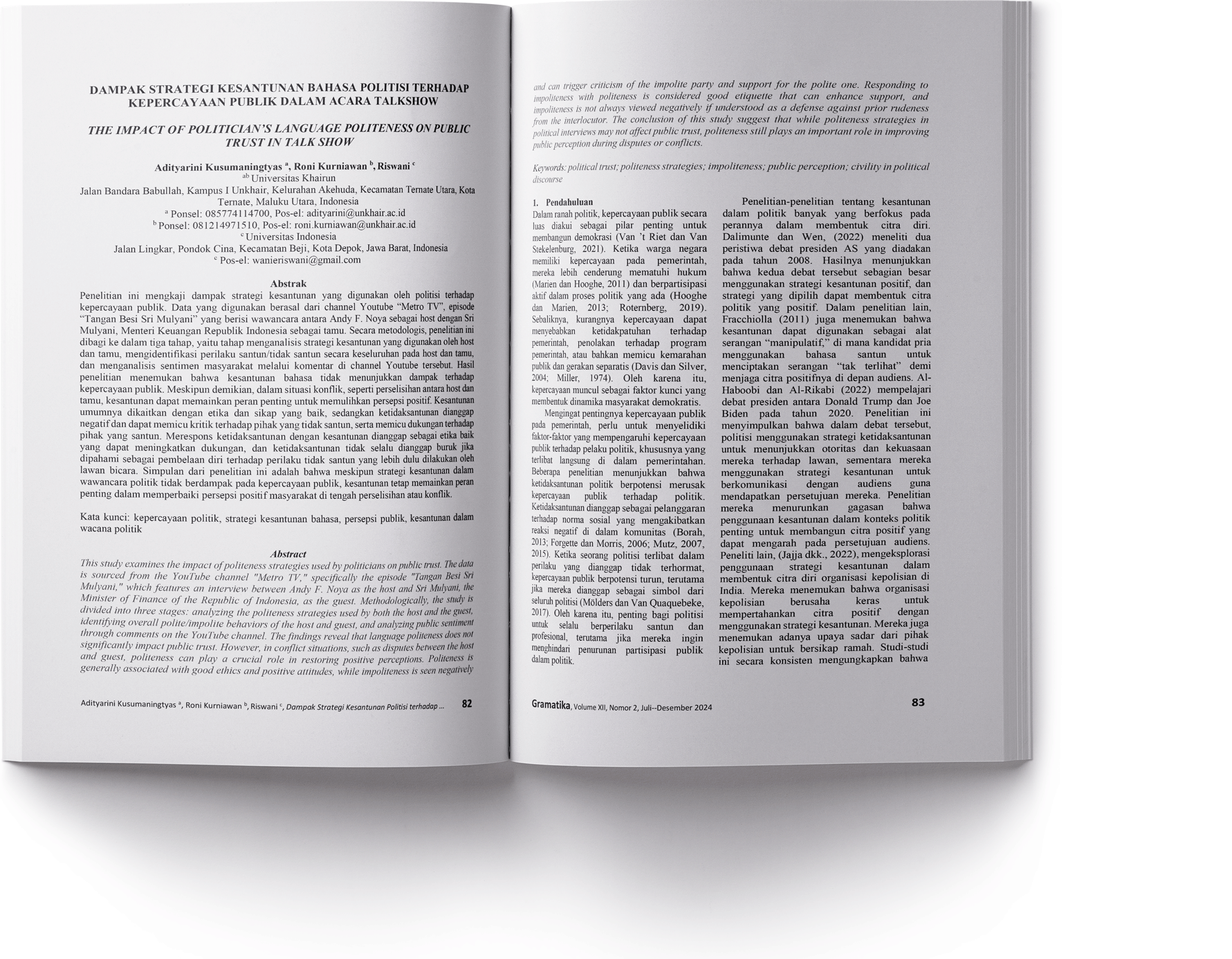DAMPAK STRATEGI KESANTUNAN BAHASA POLITISI TERHADAP KEPERCAYAAN PUBLIK DALAM ACARA TALK SHOW
Abstract
This study examines the impact of politeness strategies used by politicians on public trust. The data is sourced from the YouTube channel "Metro TV," specifically the episode "Tangan Besi Sri Mulyani," which features an interview between Andy F. Noya as the host and Sri Mulyani, the Minister of Finance of the Republic of Indonesia, as the guest. Methodologically, the study is divided into three stages: analyzing the politeness strategies used by both the host and the guest, identifying overall polite/impolite behaviors of the host and guest, and analyzing public sentiment through comments on the YouTube channel. The findings reveal that language politeness does not significantly impact public trust. However, in conflict situations, such as disputes between the host and guest, politeness can play a crucial role in restoring positive perceptions. Politeness is generally associated with good ethics and positive attitudes, while impoliteness is seen negatively and can trigger criticism of the impolite party and support for the polite one. Responding to impoliteness with politeness is considered good etiquette that can enhance support, and impoliteness is not always viewed negatively if understood as a defense against prior rudeness from the interlocutor. The conclusion of this study suggest that while politeness strategies in political interviews may not affect public trust, politeness still plays an important role in improving public perception during disputes or conflicts.
Downloads
References
Borah, P. (2013). Interactions of News Frames and Incivility in The Political Blogsphere: Examining Perceptual Outcomes. Political Communication, 30(3),456–473. https://doi.org/10.1080/10584609.2012.737426
Brown, P., & Levinson, S. C. (1987). Politeness: Some Universals in Language Usage. Cambridge University Press.
Comb, D. J. Y., & Keller, P. S. (2010). Politicians and trustworthiness: Acting contrary to self-interest enhances trustworthiness. American Psychological Association, 32(4), 328–339. https://doi.org/https://doi.org/10.1080/01973533.2010.519246
Culpeper, J. (1996). Towards an Anatomy of Impoliteness. Journal of Pragmatics, 25(3), 349–367. https://doi.org/10.1016/0378-2166(95)00014-3
Culpeper, J. (2005). Impoliteness and Entertainment in the Television Quiz Show: The Weakest Link. Journal of Politeness Research: Language, Behaviour, Culture, 1(1), 35–72.
Culpeper, J. (2011). Impoliteness: using language to cause offense. Cambridge Press University.
Dalimunte, A. A., & Wen, F. (2022). Shaping Political Image Through Politeness Strategies in The Presidential Debates. Journal of English Education Society, 7(1), 102–109. https://doi.org/https://doi.org/10.21070/jees.v7i1.1660
Davis, D. D., & Silver, B. D. (2004). Civil Liberties vs. Security: Public Opinion in the Context of the Terrorist Attacks on America. American Journal of Political Science, 45(1), 28–46. https://doi.org/https://doi.org/10.2307/1519895
Fisher, J., Van Heerde, J., & Tucker, A. (2010). Does One Trust Judgement Fit All? Linking Theory and Empirics. The British Journal of Politics and International Relations, 12(2), 161–188. https://doi.org/https://doi.org/10.1111/j.1467-856X.2009.00401.x
Forgette, R., & Morris, J. S. (2006). High-Conflict Television News and Public Opinion. Political Research Quarterly, 59(3),447–456. https://doi.org/https://doi.org/10.1093/hcr/hqab022
Fracchiolla, B. (2011). Politeness as A Strategy of Attack in A Gendered Political Debate - The Royal-Sarkozy Debate. Journal of Pragmatics, Elsevier, 2011, Women, Power and the Media, 43(10), 2480–2488. https://doi.org/10.1016/j.pragma.2011.02.006
Hooghe, M., & Marien, S. (2013). A Comparative Analysis of The Relation Between Political Trust and Forms of Political Participation in Europe. European Societies, 15(1), 131–152. https://doi.org/https://doi.org/10.1093/hcr/hqab022
Jajja, A. A., Hussain, R., & Arshad, I. (2022). The Role of Politeness Strategies in Forming the Public Self-Image of an Organization: A Mini-Ethnographic Case Study of the Punjab Police through the Pragmatic Lens. University of Chitral Journal of Linguistics and Literature, 6(I), 312–325. https://doi.org/DOI: 10.33195/jll.v6iI
Jaszczolt, K. M. (2002). Semantics and Pragmatics Meaning in Language and Discourse. Longman.
Kolbert, E. (2016). How Can Americans Trust Donald Trump? The New Yorker. https://www.newyorker.com/news/daily-comment/how-can-americans-trust-donald-trump
Marien, S., & Hooghe, M. (2011). Does Political Trust Matter? An Empirical Investigation Into the Relation Between Political Trust and Support for Law Compliance. European Journal of Political Research, 50(2), 267–291. https://doi.org/https://doi.org/10.1093/hcr/hqab022
Miller, A. H. (1974). Political Issues and Trust in Government. The American Political Science Review , 68(3), 951–972.
Mölders, C., & Van Quaquebeke, N. (2017). When and how politicians’ disrespect affects voters’ trust in the political system: The roles of social judgments and category prototypicality. Journal of Applied Social Psychology, 47(9), 515–527. https://doi.org/https://doi.org/10.1111/jasp.12458
Mutz, D. C. (2007). Effect of ‘In-your-face’ Television Discourse on Perceptions of A Legitimate Opposition. American Political Science Review, 101(4), 621–635. https://doi.org/https://doi.org/10.1093/hcr/hqab022
Mutz, D. C. (2015). In-your-face Politics: The Consequences of Uncivil Media. Princeton University Press.
Roternberg, K. J. (2019). The Psychology of Interpersonal Trust: Theory and Research (1st ed.). Routledge.
Van ’t Riet, J., & Van Stekelenburg, A. (2021). The Effects of Political Incivility on Political Trust and Political Participation: A Meta-Analysis of Experimental Research. Human Communication Research,1–27. https://doi.org/https://doi.org/10.1093/hcr/hqab022

Copyright (c) 2024 Adityarini Kusumaningtyas, Roni Kurniawan, Riswani

This work is licensed under a Creative Commons Attribution-NonCommercial-ShareAlike 4.0 International License.
The writer of published paper on Gramatika have agreed this following:
- Article copyright still had by the author.
- The author gives the first publication right of the article to Gramatika and its lisence onto Creative Commons Attribution License that allow other party to use or recitate the article but keep mention the name of original author and the first publication on Gramatika.
- The author is allowed to republish the article that Gramatika have been published it before through separated contract deal due to non-exclusive distribution (ex: submitting in to institution repository or publishing onto a book) but still mention the first publication on Gramatika.
- The author is allowed and recommended to distribute her/his papers to the virtual world (ex: in the institution repository or author’s homepage) before or during the document consignment process because can support the productive exchange also an early and wide citation.
- Every documents have been accepted should be attached with Copyright Submission Approval Form before article publication. Download the form here.








